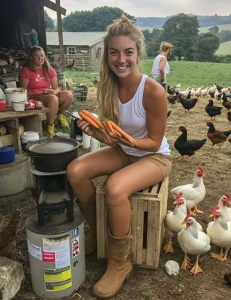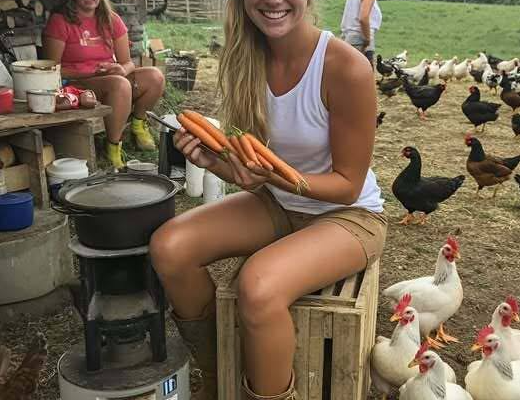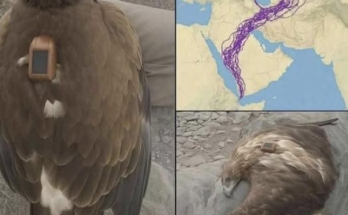
“I’m a Farmer’s Daughter — And Some People Think That Makes Me Less.”
grew up on land that taught me more about life than any classroom ever could. Acres of soil that turned hard and cracked under the sun, muddy and stubborn after a storm, or soft and warm under bare feet on summer mornings. My earliest memories are not of toys or screens but of watching my father hitch up the tractor at sunrise, of my mother calling us in for supper after long evenings of hay baling, and of the quiet rhythm of seasons that shaped everything around us. I’m a farmer’s daughter, through and through. It’s woven into me like the grain lines in barnwood.
But somewhere along the way, I learned that not everyone sees that as something to admire. To some people, it makes me less — less sophisticated, less educated, less ambitious, less worldly. I can’t count the number of times someone has raised an eyebrow after asking where I grew up, as if farmland is a limitation instead of a heritage. More than once, someone smirked when I mentioned chores, livestock, or harvest season, as if those things belong to a life beneath their understanding.
I used to shrink under that judgment, even though I never wanted to. When you’re young, you absorb the way others view you before you learn to stand in your own truth. I remember being in middle school when a classmate’s mother, hearing where I lived, commented, “Oh, I guess she doesn’t need fancy clothes. Farm kids get used to dirt.” It was meant as a joke, but I felt its sting for years. For a while, I scrubbed my shoes harder, tried to hide the calluses on my hands, and avoided mentioning that I sometimes helped bottle-feed calves before school. I wanted to fit in, to be seen, to be accepted.
But it didn’t matter how hard I tried. The label stuck: “farmer’s daughter” — uttered in the same tone someone might use for “simple” or “unsophisticated.” People assumed I didn’t travel much. They assumed college would be difficult. They assumed I didn’t follow world events or that I wouldn’t understand a conversation about modern technology. They didn’t know that I grew up fixing machinery, troubleshooting irrigation pipes, calculating yields, and helping my father plan budgets before I knew what half those terms meant. They didn’t know a farm kid learns problem-solving the way other kids learn video games.
And they definitely didn’t know the far corners of the world I’d visited through books, stories, and the internet — the places I dreamed of seeing once I was old enough to build my own path.
There’s a quiet dignity in farm life. Nobody prepares you for how strong it makes you. You learn early that weather does not care about your feelings. Cows break out of fences whether you’re tired or not. Wheat waits for no one. You get up before dawn, you keep going when the work’s not done, and you learn that complaining doesn’t plant seeds or mend broken balers. You also learn beauty in simple rituals: the glow on fields just after sunrise, the hum of cicadas in evening heat, the steadiness of animals who trust you.
When I left home for college, I noticed something interesting: the people who underestimated me worked harder to get ahead than I did. They had never spent a summer working dawn to dusk. They had never handled the responsibility of caring for living creatures. They had never faced failure that wasn’t academic or social but literal survival — crops dying, storms ruining months of labor, machinery failing at the wrong moment. Hardship wasn’t new to me; it was a familiar neighbor. So I pushed through my classes, my jobs, my deadlines with a kind of determination I didn’t know was rare.
The deeper truth is this: growing up on a farm doesn’t make someone less. If anything, it gives you more — more resilience, more grit, more humility, more understanding of how the world feeds itself, more compassion for cycles of life and death, more appreciation for things most people take for granted.
But people judge what they don’t understand. I’ve seen individuals wrinkle their noses at the thought of mucking stalls or gathering eggs, not realizing these small, everyday tasks sustain the very society that thinks so little of them. They mistake dirt for ignorance, labor for lack of intelligence, and rural roots for limitation. They don’t know that many of the smartest, most inventive people I’ve ever met were farmers or ranchers — men and women who could diagnose a broken engine by sound, identify a crop disease by sight, or predict the coming weather by watching the sky.
I won’t pretend the judgment doesn’t still bother me sometimes. When someone dismisses my background, it hits a place that still remembers being that self-conscious teenager scrubbing away good, honest dirt. But now, instead of shrinking, I feel a fire light in my chest. If being a farmer’s daughter is supposed to make me less, then let me show you how wrong that assumption is.
It makes me strong.
It makes me capable.
It makes me grounded.
It makes me grateful.
And most of all, it makes me aware of the foundation the rest of the world stands on. Cities rise, technology advances, trends shift every minute — but none of it matters without the people who plant seeds, raise livestock, harvest fields, and wake up every day at dawn to keep the world turning. Agriculture isn’t glamorous, but it’s essential. My father, and everyone like him, carries a weight most people never see.
As I’ve grown older, I’ve realized that the people who judge the loudest often understand the least. They look down because they don’t know what it takes to build something with your hands, to steward land, to live on a cycle older than civilization itself. They’ve never watched a calf take its first steps or a field turn gold in late summer. They’ve never had to measure self-worth by effort instead of appearance.
Some people think being a farmer’s daughter makes me less.
I disagree.
It has made me more — more than I ever understood when I was younger. It has shaped my work ethic, my worldview, my resilience, and my character. It taught me that worth isn’t determined by zip code, wardrobe, or pedigree. Worth is built every morning you get up and face what needs to be done — not because someone sees you, but because it has to be done.
And when people underestimate me now, I smile. Because deep down, I know something they don’t:
While they were learning how to impress others, I was learning how to survive, how to endure, and how to quietly thrive in a world that underestimates the power of those who grew up close to the earth.
I’m a farmer’s daughter.
And that doesn’t make me less.
It makes me exactly who I’m meant to be.

